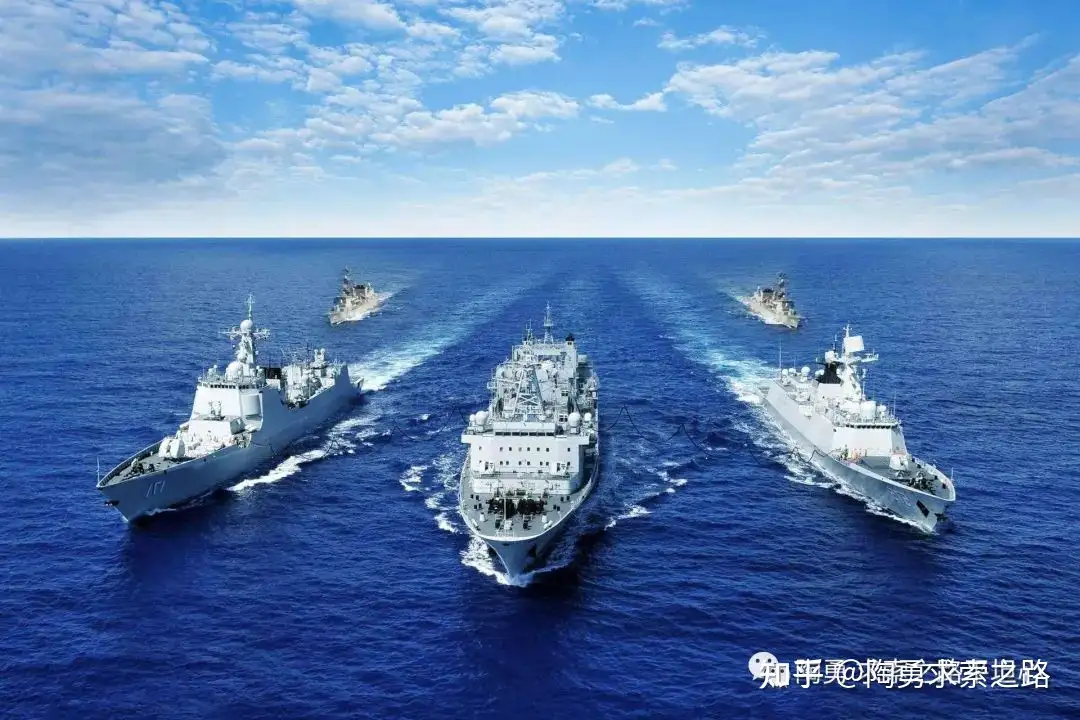
CHAPTER ONE
第一章
Introduction
报告简介
This report explores scenarios of systemic U.S.-China conflict in a situation in which China has neared global primacy. To help illuminate how a U.S.- China war might unfold in such a circumstance, the authors examine trends in warfare and geopolitics, the behavior of select past great powers, and relevant patterns of interstate conflict. From these data, the authors formulate two scenarios of systemic U.S. China conflict war—one that is low-intensity and another that is high-intensity.
本报告探讨当中国接近全球主导地位的情况下,美中系统性冲突模式。为了有助于说明美中战争在此前提下将如何展开,作者研究了战争和地缘政治趋势、既往一些大国行为与国家间冲突相关模式。根据这些数据,作者提出了美中系统性冲突战争的两种模式:一种是低强度的,另一种是高强度的。
Background: An Intensifying Great Power Competition
背景:不断加剧的大国竞争
Following the end of the Cold War, the United States of America enjoyed a position of global supremacy unsurpassedin human history. At the height of its power, the United States accounted for a quarter of global economic activity, deployed the world’s most advanced mil-itary, and experienced unmatched political and cultural influence.1 Currently, however, the nation’s unipolar moment is ending. By virtually every measure of national power, the strate-gic position of the United States has weakened as its economic growth rate has slowed relative to that of many other countries, including China. Whether and how much longer the United States can retain its position of global leadership has proven a topic of intense debate.2 At the very least, experts acknowledge that U.S. primacy can no longer be regarded as uncontested.3 The 2021 Interim National Security Strategy acknowledged that the “distribution of power across the world is changing” and characterized China as the “only competitor” that could “mount a sustained challenge to a stable and open international system.”
冷战结束后,美国获得了人类历史上无可比拟的全球霸主地位。在其权力巅峰时期,美国经济分量占据全球四分之一比重,部署了世界上最先进的军事力量,并拥有无与伦比的政治和文化影响力。然而,目前美国的单极荣光时刻正在结束。从衡量国家实力的几乎所有标准来看,美国的战略地位已经减弱,因为相对包括中国在内的许多其他国家,美国经济增长率已经放缓。事实上,美国是否能够继续保持全球领导地位以及还能保持多久,是一个激烈争论的话题。2至少,专家们承认,美国的首要地位已经不是无可争议了。3 《2021年国家安全临时战略》承认,"全球权力分配正在发生变化",并将中国定性成 "唯一的竞争者",可以 "对稳定和开放的国际体系发起持续地挑战"。
The Return of Great Power War
Second only to the United States in the size of its economy and with a leadership eager to realize the nation’s revitalization, China stands as the nation’s only credible contender for global leadership. It should be noted that China’s ability to surpass the United States as a global leader is far from clear; there are ample reasons to doubt the prospect. Decades of robust growth obscure a Chinese economy encumbered by severe weaknesses. Moreover, the nation faces a gloomy demographic outlook and restrictive political geography. The apparent strength and resolve of the central political leadership scarcely conceals fragility arising from an overly centralized and repressive authoritarianism.5 China also does not appear to have an ambition to replicate U.S.-style global leadership, which may not be feasible in any case. Yet the possibility that China overcomes many or most of these formidable obstacles and begins to more aggressively contend for global primacy cannot be completely ruled out either. Given the potential implications for U.S. security of such an outcome, an analysis of what conflict under such conditions mean for America’s security seems prudent.
当前,中国的经济规模仅次于美国,其领导层急于实现民族复兴,是中国在全球领导力竞争中唯一可信的代表。应该指出地是,中国是否有能力超越美国成为全球领导者还不明晰;但却有足够的理由怀疑这一前景。因为,几十年的强劲增长掩盖了中国经济的严重弱点;除此之外,中国还面临着惨淡的人口前景和限制性的政治地理环境。中央政治领导层表面上的力量和决心几乎掩盖了过度集中和压制的威权主义所带来的脆弱性。5 中国似乎也没有复制美国式全球领导地位的雄心,这在任何情况下都是不可行的。然而,也不能完全排除中国克服许多或大部分这些巨大的障碍,开始更积极地争夺全球主导权的可能性。鉴于这种结果对美国安全的潜在影响,分析这种条件下的冲突对美国的安全意味着什么似乎不是多余的。
The intensification of U.S.-China strategic competition introduces political and secu-rity challenges that in key ways exceed what U.S. policymakers faced during the Cold War. Although the U.S.-Soviet zero-sum ideological conflict may be absent, the United States faces a far stronger contender in China than it ever faced in the Soviet Union. Moscow posed a powerful military challenge in Europe and owned a massive nuclear arsenal. It also exercised significant international political influence, especially among decolonizing Third World countries. But outside these areas, Soviet power lagged that of its American competitor by wide margins. Its economy never reached more than a fraction of that of the United States. The Soviet military maintained robust ground forces in Europe, but it suffered an overall technological inferiority and lacked the ability to project power globally.
美中战略竞争的加剧带来了政治和安全挑战,甚至在关键方面超过了美国政策制定者在冷战期间面临的挑战。
虽然美苏零和的意识形态冲突可能不复存在,但美国当前面临的中国竞争者远比过去面临的苏联竞争者更为强大。莫斯科在欧洲形成了强大的军事挑战,并拥有一个庞大的核武库。它还发挥了重要的国际政治影响,特别是在非殖民化的第三世界国家中。但在这些领域之外,苏联的力量远远落后于美国竞争对手。它的经济实力仅占美国的小部分。苏联军队在欧洲保持着强大的地面部队,但它在总体技术上处于劣势,缺乏全球投射能力。
By contrast, U.S.-China competition has rapidly expanded beyond the military to techno-logical, ideological, political, and economic domains. The two sides continue to face danger-ous flash points near China and argue over the role of human rights, democracy, and indi-vidual freedoms in international politics. The People’s Liberation Army (PLA) has grown into a formidable force possessing impressive technological capabilities, even if it continues to lag the U.S. military in key ways.6 Moreover, unlike during the Cold War, which saw the United States enter the contest near the zenith of its economic might, in the current rivalry, the nation is in a period of relative decline. Even as its growth trajectory slows, Chinese national power continues to accrue at a faster rate than that of its American competitor. The size of China’s economy could exceed that of the United States in nominal terms by the 2030s, although experts continue to debate that possibility.7 If current trends continue, a U.S. mili-.tary facing flat budgets could confront an increasingly powerful and modern Chinese mili-tary.8 The same trends raise the risk that Chinese leaders could become emboldened in their approach to long-standingflash points such as the South China Sea or Taiwan and might risk conflict to achieve their goals.9 Nor is there likely to be a quick and easy resolution to this imposing strategic challenge. Owing to deep structural drivers, the U.S.-China competition is expected to last many years, if not decades.
相比之下,美中两国的竞争已经迅速扩大到军事以外的技术逻辑、意识形态、政治和经济领域。双方在中国周边继续面临危险的爆发点,并就人权、民主和个人自由在国际政治中的作用进行争论。中国人民解放军(PLA)已经成长为一支强大的力量,拥有令人印象深刻的技术能力,尽管它在关键方面仍然落后于美国军队。此外,与冷战时期不同的是,美国是在其经济实力接近顶峰的情况下参加(军备)竞赛的。而在当下的竞争中,美国正处于一个相对衰落的时期。而中国即使增长有所放缓,但国力的增强速度仍然比竞争对手美国更快。预计到2030年,中国经济规模按名义价值计算可能超过美国,尽管专家们对这种可能性仍有争议。如果目前的趋势继续下去,面临预算持平的美国军队将面对日益强大和现代化的中国军队。同样的趋势也使中国领导人在处理南海或台湾等长期存在的热点问题时更加无所顾忌,并可能冒着冲突的风险来实现其目标。对于这一严峻的战略挑战,也不可能有一个快速和简单的解决方案。由于深层次的结构性因素,美中之间的竞争预计将持续多年,甚至几十年。
Introduction
同样的趋势也使中国领导人在处理南海或台湾等长期存在的热点问题时更加胆大妄为,并可能冒着冲突的风险来实现其目标。由于深层次的结构性因素,美中之间的竞争预计将持续多年,甚至几十年。
Defining a Leading Great Power
界定一个领先的大国
Should China successfully realize its ambitious Belt and Road Initiative (BRI), a Chinese-led effort todevelop a massive trade and infrastructure network spanning much of Africa and Eurasia, the United States could one day find itself confronting a peer rival for global leadership possessing immense national power. Theorists of international relations have long concluded that the struggle for international primacy among rival great powers tends to be prone to systemic conflict. It is this moment of near global primacy—that is, a moment at which China as a peer power begins to more aggressively contend for the mantle of global leadership—that we focus on in this report. But before we can proceed with analyzing such a situation, we will clarify what we mean byglobal primacyand why this could drive systemic conflict.
如果中国成功实现其雄心勃勃的一个由中国主导的、横跨非洲和欧亚大陆的大规模贸易和基础设施网络之 "一带一路 "目标(BRI),美国就会发现自己面对的是一个国力强盛的全球领导地位的同级竞争对手。国际关系理论家早就得出结论,竞争大国之间争夺国际首要地位的拼斗往往容易发生系统性冲突。我们在本报告中关注的正是这种接近全球主导地位的时刻——即中国作为一个匹敌大国开始更积极地争夺全球领导地位的时刻。但在我们着手分析这种情况之前,我们将澄清我们所说的全球首要地位是什么意思,以及为什么这可能造成系统性冲突。
In every age, one country or set of countries tends to stand out as the most powerful. Yet how to define and measure the strength of these high performers remains much disputed. Scholars have employed a variety of terms to communicate different aspects of national strength, such asgreat powers,world powers, orfirst-rate powers. Typically, scholars use the termgreat powerto refer to a class of powerful countries with the ability to profoundly shape international politics. Paul Kennedy has highlighted the importance of economic and military power as essential to this class of nations.11 Realist theorist Kenneth Waltz, by contrast, proposes five criteria for defining a great power: population and territory; resource endowment; economic capability; political stability and competence; and military strength.12 William Wohlforth and Steven Brooks argue against the concept of “polarity” in favor of a method that measures national power in terms of military, economic, and techni-cal capacity.
在各个时代,一个国家或“一群”国家往往会作为最强大的国家脱颖而出。然而,如何定义和衡量这些崛起国家的实力,仍然存在很大争议。学者们采用了各种术语、从不同角度表述国家实力,如大国、世界大国或一流大国。通常情况下,学者们用大国这个词来指代一类有能力深刻影响国际政治的强大国家。保罗——肯尼迪强调了经济和军事力量对于这类国家的重要性。11 而现实主义理论家肯尼思——华尔兹则提出了定义大国的五个标准:人口和领土;资源禀赋;经济能力;政治稳定和能力;以及军事力量。12 威廉-沃尔福斯和史蒂芬-布鲁克斯反对 "极性 "的概念,赞成用军事、经济和技术能力来衡量国家实力的方法。
The Return of Great Power War
Among the great powers, different configurations with different risks of conflict are possible. Some theorists have argued that a diffusion of power among states, such as in “multipolar” situations, may offer the best prospects for international stability.14 Other the-orists have focused on the dynamism of situations featuring a high degree of concentrated power. Specialists in power transition scenarios in particular have claimed that great power wars fundamentally aim to decide the issue of hegemony and leadership in a system or subsystem.15 For these scholars, the termspreeminenceorprimacydescribe a country that enjoys the first rank, or highest-level status, among other countries. Such countries have an unusually high concentration of national power, as measured by a greater share of eco-nomic, military, and political power than any other country. Such powerful states also are typically understood to have greater international influence than others.
在大国之间,有可能出现具有不同冲突风险的不同配置。一些理论家认为,国家间的权力分散,如在"多极 "情况下,可能为国际稳定提供最佳前景。其他理论家则关注以高度集中的权力为特征的情况动态。特别是研究权力过渡情况的专家声称,大国战争的根本目的是决定一个系统或子系统中的霸权和领导权问题。15 对这些学者来说,"优势"或"首要地位 "这些术语描述了一个国家在其他国家中享有第一等级,或最高级别的地位。这类国家的政府权力异常集中、以比其他国家更多的生态、军事和政治权力份额来衡量,这种强国通常也被理解为比其他国家具有更大的国际影响力。
For such states, scholars have highlighted qualities such as the possibilities of domination and control. The termhegemon, often associated with a variant of realist international relations theory that emphasizes the role of a single, dominant hegemonic power, refers to the idea that one coun-try exercises political, economic, or military predominance or control over other states. Robert Gilpin, a foremost theorist of the role of hegemons, has argued that the international order is most stable when there is one hegemon and that, as the power of the incumbent hegemon wanes, dissatisfied rising hegemons will contend for a position of primacy. The clash between the incumbent and rising hegemons will, according to this theory of “hege-monic stability,” result in war.16 A. F. K. Organski, in particular, has developed the theory of “power transition warfare,” in which the status quo and rising hegemons fight to decide the issue of international primacy. 17 The theory of power transition warfare between rising and declining great powers has found some empirical support.18 However, the theories have been criticized as well. One criticism of the termhegemonis that it implies that a country can exercise a level of oppressive domination and control that most countries might find intolerable and that few countries can exercise in practice. Chinese official documents rou-tinely hurl the accusation of hegemonic behavior against the United States with this argu-ment in mind.
对于这样的国家,学者们强调了诸如支配和控制的可能性等品质。霸权一词,通常与现实主义国际关系理论的一个变种相关,强调单一的、占主导地位的霸权国家的作用,指某个国家利用政治、经济或军事上的优势对其他国家实施掌控的企图。最重要的霸权作用理论家罗伯特-吉尔平认为,当只有一个霸权时,国际秩序是最稳定的,但随着唯一霸权国家的衰落,挑战现实的后起霸权将争夺首要霸权地位。根据这一 "霸权稳定 "理论,现任霸权和崛起霸权之间的冲突将导致战争。特别是奥根斯基提出了 "权力过渡战争 "的理论,在这个理论中,现任霸权和崛起霸权将为争夺国际首要地位而战。大国崛起与衰落之间的权力过渡战争理论已经找到了一些经验上的支持。然而,这些理论也受到了批评。对 "霸权 "一词的批评是,它意味着一个国家可以行使一定程度的压迫性统治和控制,而大多数国家可能认为这是不可容忍的,在实践中,很少有国家能够行使这种权利。中国的官方文件经常对美国的霸权主义行为提出指责,并以此为论据。
Introduction
Another criticism of realist theory is its lack of attention to the structureand dynamics of the world economy.20 Critics Richard Lebow and Benjamin Valentino have also questioned the theory, arguing that power transitions have been “remarkably rare” and “tended to happen peacefully.”21Politicals cientists have offered alternative terms to describe a supremely powerful nation, such as that of aleading powerorsystem leader. Associated with the theories of world systems or long cycle theory, such terms emphasize the role played by an exceptionally capable nation in organizing and leading the global economy. These experts tend to emphasize the way eco-nomic power underpins global military and political power. Immanuel Wallerstein’s “world systems” theory describes a group of core leading economies that dominated the global econ-omy.22 Long cycle theorists George Modelski and William Thompson have defined global system leaders as specialists in “long-distance commerce and advanced industrial produc-tion,” which also provide “political and military leadership at the global (intercontinental) level.” 23 The systems approach has drawn attention to the critical role that powerful nations play in leading and organizing global economic activity.
对现实主义理论的另一个批评是它缺乏对世界经济结构动态的关注。20 批评家理查德莱博和本杰明瓦伦提诺也对这一理论提出质疑,认为权力过渡 "非常罕见","往往是和平发生的 "21。政治学家们提供了另一种术语来描述极其强大的国家(超级大国——译者注)——如领导国或系统领导者。与世界体系或长周期理论相关,这些术语强调了特别有能力的国家在组织和领导全球经济方面的作用。这些专家特别强调国家经济实力是支撑军事和政治力量的后盾。伊曼纽尔-沃勒斯坦的 "世界体系"理论描述了一批主导全球经济的核心经济体。22 长周期理论家乔治-莫德斯基和威廉-汤普森将全球体系的领导者定义为 "远程商业和先进工业生产 "的专家,他们还提供 "全球(洲际)层面的政治和军事领导力。"23 体系方法使人们注意到强国在领导和组织全球经济活动中的关键作用。它们还为经济优势、地缘政治优势和权力过渡战争之间的联系提供了有趣的解释。然而,基于系统的方法经受了一些批评,因为它过分关注技术和经济能力,而对政治和军事力量的重要性强调不足。
They also offer an intriguing expla-nation for the connection between economic predominance, geopolitical primacy, and wars of power transition. The systems-based approach has enduredsome criticism, however, for focusing excessively on technological and economic capabilities and underemphasizing the importance of political and military power.
Both schools of thought have their advantages and disadvantages. The hegemonic stability/ realist approach notes the importance of preponderance in economic, political, and mili-tary power among top-tier powers. It also emphasizes the importance of international influ-ence as an aspect of strength. The system leader school complements these insights with its valuable insight into the way internationally preeminent nations organize and shape the structure of the global economy. We wish to capture these insights in our understanding of global primacy. Accordingly, we use the termleading great powerto mean a country that has achieved a level of global preeminence—first rank—in terms of concentrated economic, political, and military power. Such a nation exerts a preponderant international influence and is also dominant in organizing and leading the global economic system.Global primacyis used interchangeably as the condition that characterizes the situation of the leading great power.
这两个学派都有其优点和缺点。霸权主义稳定/现实主义方法注意到顶级大国在经济、政治和军事力量上占优势的重要性,它还强调了国际影响力作为实力方面的重要性。系统领袖学派通过国际领军国家如何组织和塑造全球经济结构之高屋建瓴观点补充了这些见解。我们希望在对全球主导地位的理解中抓住这些见解。因此,我们使用领先大国一词,指的是在经济、政治和军事力量等方面达到全球领先水平的国家。这样的国家发挥了突出的国际影响力,并且在组织和领导全球经济体系方面具有主导地位。全球首要地位可交替使用,作为主导大国状况的特征条件.
The Return of Great Power War
Defining Systemic Conflict Among Rival Leading Powers
界定对立领军国家之间的系统性冲突
Although both the hegemonic stability/realist and system leader schools of thought disagree on definitions and key points of emphasis, they agree that the global leading power tends to exert a stabilizing influence when at the height of its power, but that its ascent or descent is likely to coincide with considerable instability and/or conflict. The period of instability accompanying the rise or decline of great powers is, per Organski, often referred to as one of “power transition.”25 Since we are interested in analyzing potential scenarios of U.S.-China conflict, we focus on such a hypothetical period of Chinese ascent and U.S. relative decline. In our hypothetical scenarios, China may not have decisively achieved a position of global primacy yet, but it is poised to do so. Its situation may be described as one of nearing global primacy, but still in the processing of contending with the United States for that position. By many, but perhaps not all, measures of national power, China would have roughly equaled, slightly surpassed, or fallen just shy of those of the United States. China may be nearing or have gained a modest edge over the United States as a leading organizer of the global economy as well. In such a situation, Beijing’s claims to have secured global primacy would strike many people as plausible, though the claims could be debated given the intensity of U.S. efforts to fend off China’s challenge. It is important to emphasize how this hypothetical situation dif-fers from today. In 2022 China may be regarded as a serious competitor to the United States, but few would regard as credible any claim that it has neared the point of displacingUnited States to become the leading global power.
尽管霸权主义稳定/现实主义学派和体系领袖学派在定义和强调的关键点上都有分歧,但他们都认为,全球领先大国在其力量最强大的时候往往会发挥稳定的作用,但其上升或下降很可能与相当的不稳定/或冲突同时出现。按照奥根斯基的说法,伴随着大国崛起或衰落的不稳定时期通常被称为"权力过渡"。25 因为我们对分析潜在的美中冲突情形感兴趣,我们将重点放在中国崛起和美国相对衰落的这种假设时期。在我们的假设情景中,中国可能还没有决定性地取得全球首要地位,但它已准备好这样做。中国当前的状态可以被描述为接近全球首要地位,但却在与美国争夺这一地位的过程中。根据许多但也许不是所有的国力衡量标准,中国将大致等同于、略微超过或略微落后于美国。作为全球经济的主要组织者,中国也可能接近或获得对美国的适度优势。在这种情况下,北京声称已经获得了全球首要地位,这让很多人觉得颇有道理——尽管考虑到美国为抵御中国的挑战所做的努力,这种说法可能会引起争论。重要的是要强调这种假设的情况与今天有什么不同。2022年,中国可能被视为美国的强力竞争对手,但很少有人会认为任何关于中国已接近取代美国成为全球领先大国的说法是可信的。
We focus on this hypothetical moment of aggressive Chinese efforts to contend for global primacy because it carries the highest risks of major war according to the established find-ings of international relations theory.26 How the two countries manage that moment could carry immense implications for both countries and for the world. Although the possibility of a peaceful power transition exists, in this report we focus on the possibilities of systemic conflict. A key assumption of the report is that the United States has both the capability and the determination to resist its supersession and that both sides thus face compelling incen-tives to resort to force to assert or defend global primacy. Because this type of conflict is intricately related to the question of international leadership, it would not likely be resolved by a single battle. Rather, the conflict would assume a chronic, systemic form. As in past examples of power transition warfare, the two countries could fight in multiple engagements over a relatively long span of time, perhaps lasting for many years, and in a geographically unconstrained manner. Extensive conflict could involve many partner nations and manifest in various forms of interstate and intrastate conflict with varying levels of involvement by the two rivals as well. The escalation risks would remain high due to the underlying drive for supremacy. Conflict would thus assume a serial, persistent condition that could endure for years and that would end only when one side exhausted its ability to keep fighting and accordingly acknowledged its subordination to the other.
我们关注的是中国为争夺全球首要地位而进行的挑战性努力这一假设,因为根据国际关系理论的既定结论,它具有最高的大规模战争风险。两国如何应对这种状况可能对两国和世界产生巨大影响。虽然和平的权力交接的可能性是存在的,但在本报告中,我们关注系统性冲突的可能性。本报告的一个关键假设是,美国有能力也有决心遏制对它的超越,因此双方都面临着诉诸武力来维护或捍卫全球首要地位的强烈动机。由于这种类型冲突错综复杂地与国际领导权问题纠缠一起,它不可能一劳永逸地解决。相反,冲突会呈现出一种长期、系统性的形式。就像过去的权力过渡战争一样,两个国家可能在相对较长的时间内多次交战,可能会持续很多年,而且在地理上不受限制。广泛的冲突可能涉及许多伙伴国,表现为各种形式的国家间和国内冲突,两个对手也会有不同程度的参与。由于争夺霸权的潜在动力,冲突升级的风险仍然很高。因此,冲突将成为一种连续的、持续的状况,可以绵延数年。只有当一方耗尽其继续战斗的能力并相应地承认其对另一方的从属地位时才会结束。
Introduction
An adversarial China that had neared a position of global primacy could pose an excep-tionally formidable challenge to the United States, which has not fought a great power from a position of parity or inferiority since the War of 1812. By the mid-1800s, the U.S. economy had already surpassed in size and wealth that of the United Kingdom—the leading great power of its day. By any economic measure, the United States became the world’s most powerful nation by 1916, although Washington resisted assuming global responsibilities commensu-rate with its strength until after World War II.27 The United States fought formidableCen-tral and Axis power adversariesin the two World Wars, but its industrial might gave it aninsuperable advantage. Even against the Soviet Union, the United States competed from a position of strength, with an economy many times more productive and richer than that of its communist rival. Lessons from past wars are also constrained by the fact that those wars happened in the past. Distinctive features of geopolitical arrangements, the state of military technology, and the nature of war all shaped past rivalries and conflicts in ways that may not be relevant today.
一个已接近全球首要地位的对手中国可能会对美国构成特别可怕的挑战,因为自1812年战争以来,美国还没有从平等或劣势的位置上与一个大国作战。到19世纪中期,美国的经济规模和财富已经超过了英国——当时的领先大国。从任何经济角度来看,美国在1916年成为世界上最强大的国家,尽管华盛顿一直到二战后才承担与其实力相称的全球责任。27美国在两次世界大战中跟强大的同盟国与轴心国敌手作战,凭借的就是其工业实力带来的不可超越之优势。即使是对阵苏联,美国也是以实力取胜,其产业生产力和富裕程度比其苏联对手高出许多倍。从过去的战争中得到的教训对于今天的警示有限,因为这些战争发生在过去。地缘政治安排的独特特点、军事技术的状况和战争的性质形成了过去的竞争和冲突,而那些既有的“经验”在今天可能已经不适用了。
Under conditions of a China nearing global primacy, the onset of U.S.-China hostilities could raise the risks of militarized crises and military clashes across many parts of the world. The risks of a global confrontation could be amplified by the advent of new, poorly under-stood civilian and military technologies and unprecedented historical developments. As one example, the ability of cybertechnologies to inflict massive damage and dislocation raises problematic new escalation risks. Chinese success in expanding a network of client states could also result in confrontations and crisis situations that appear implausible today.
在中国接近全球主导地位的情况下,美中敌对行动的爆发可能会增加世界许多地区发生军事化危机和军事冲突的风险。全球对抗的风险可能会因为新的、鲜为人知的民用和军用技术的出现以及前所未有的历史发展而增大。例如,网络技术造成大规模破坏和混乱的能力引发了新的升级风险。中国在扩大客户端网络(互联网根服务器源自美国,所以,其他国家网络均为客户端应用——译者注)方面的成功,也可能导致对抗和危机局势。尽管今天看来颇为不可思议。
Systemic U.S.- China conflict would clearly carry significant implications for the security of the United States, yet to date there has been little serious effort to analyze them. Key questions include: How might China’s national and security goals change in a systemic conflict with the United States? How might the PLA operate and modernize its forces in such a situation? Where might conflict involving Chinese and U.S. forces unfold? How might the two militaries fight each other? What distinctive features of the Chinese military might enable or impede their combat operations against U.S. forces? While the answers to these questions remain ultimately unknowable, this report aims to encourage a preliminary consideration of them.
系统性的美中冲突显然会对美国国家安全产生重大影响,但迄今为止,几乎没人认真分析过这些问题。相关关键问题包括:在与美国的系统性冲突中,中国国家安全目标可能发生怎样的变化?而中国人民解放军将如何应对并进行现代化建设?中国和美国军队可能在哪里擦枪走火、爆发冲突?中美两军将以什么样的形式交战?中国军方具有哪些明显的优劣势支撑或妨碍其对抗美军作战行动?虽然这些问题的答案目前仍不可知,但本报告旨在鼓励人们对这些问题进行初步的思考。
Sources and Methodology
来源和方法学
The exploration of hypothetical conflict situations that do not exist today and may never happenposes important methodological challenges for research. What data can we draw on for such hypothetical reasoning? On what basis can we make our judgments? We acknowledge up front that such research unavoidably involves considerable conjecture, and we qualify our findings accordingly. This report aims to provide a form of informed speculation; it is not a prediction. It is designed to provoke thought and consideration of potential futures beyond the most immediate and obvious trends. Yet, to be valuable, such analysis should be as rigor-ous and data-informedas possible. We carried out our analysis through a methodology that synthesized current and historical data on relevant factors with research-grounded specula-tion. For this project, we considered academic findings regarding China’s approach to future warfare, key trends in international politics and warfare that will likely persist through the next few decades, and relevant experiences from previous great powers. Drawing from these findings, we then hypothesized how the Chinese military could fight in low and high inten-sity systemic conflicts.
探讨今天不存在甚至永远不会发生的假设性冲突情形,给研究提出了重大方法论挑战。对于这种假设性的推理,我们可以借鉴哪些数据?我们凭借什么基础做出判断?我们首先承认,此类研究不可避免地包含大量猜测,因此,我们对研究发现进行了相应的限定。本报告根据相关信息提供一种推测;但不是预测。它的目的是引发思考并透过现象看本质地关注未来的潜在不测。但是,报告的价值呈现在于,其分析尽可能严谨和依据客观数据。我们通过综合当前和历史数据相关要素的方法来研究并进行推测。在这个项目中,我们考虑了有关中国未来战争方式的学术研究结果、国际政治和战争可能持续到未来几十年之关键趋势和既往大国的相关经验。根据这些信息,我们推测中国军队在低强度和高强度的系统性冲突中的应对模式。
We sought in particular to understand and represent Chinese perspectives as much as possible. However, the limitations of publicly available Chinese-language sources on these topics should be noted up front. Political sensitivities discourage Chinese scholars and experts from exploring in detail the possibilities of a broader, global U.S.-China war. To be sure, PLA scholars have discussed the operational challenges of fighting a “strong enemy,” which is usually a thinly veiled reference to the United States. However, such sourcestend to discuss more general imperatives for military readiness or to consider potential contin-gencies within the context of existing flash points such as Taiwan.28 To date we have found virtually no credible publicly available sources that examine more speculative scenarios of U.S.-China conflict, such as chronic, long-term war, wars of power transition, or U.S.-China conflict scenarios outside the first island chain. Some PLA scholars do acknowledge the pos-sibility of major war with the United States, but they do not examine the possibility in depth, perhaps owing to their judgment that such conflict is improbable or perhaps due to political constraints. In light of such limited sources, we have extrapolatedpossible Chinese political and military strategy precepts and directives to inform our analysis, but we acknowledge that such an approach must be treated as speculation, not fact.
我们力求做到尽可能地了解和呈现中国的观点。然而,我们必须首先指出,有关这些研究课题之公开中文资料信息的局限性。政治敏感性使中国学者和专家忌讳从细节上探讨广泛的、全球性的美中军事冲突的可能性。可以肯定的是,解放军学者已经讨论过与 “强敌 ”爆发冲突的挑战,“强敌”通常是对美国的含蓄指称。然而,这些资料倾向于讨论更普遍的军事准备的必要性,或在现有的热点如台湾的背景下考虑潜在的连续性。28 迄今为止,我们几乎没有发现任何可信的公开资料来研究美中冲突的更多猜测性情景,如长期的战争,权力过渡的战争,或第一岛链之外的美中冲突事件。一些解放军学者确实承认美中发生重大战争的可能性,但他们没有深入研究这种可能性,也许是由于他们判断这种冲突是不可能的,也许是由于政治限制。鉴于这些有限的信息来源,我们根据推断中国可能的政治和军事战略戒律和指令来为我们的分析提供信息,但我们承认,这种方法必须被视为猜测,而不是事实。
The first part of this report outlines a series of research findings regarding broad trends related to international politics and war, patterns of interstate conflict among rising great powers, and findings regarding the drivers of great power war. Chapter Two sets the context by outlining key geopolitical and military trends that experts have regarded as likely to per-sist for several decades. It explores how these trends could affect the prospect for U.S. China conflict under conditions in which China nears global primacy. In Chapter Three we exam-ine patterns in the conflict behavior of leading great powers for insight intothe potential forms that systemic U.S.-China conflict might take. We analyze in particular the experiences of the Soviet Union, the United Kingdom, and the United States as global powers. Although the Soviet Union never exercised hegemony on the scale of the United Kingdom or the United States, it did exert considerable influence over large swaths of Eurasia, and its role as the most
本报告的第一章概述了一系列与国际政治和战争有关的广泛趋势的研究结果,崛起的大国之间的冲突模式,以及有关大国战争爆发原因的研究结果。第二章通过阐述专家们认为可能持续数十年的关键地缘政治和军事趋势来确定背景。它探讨了在中国接近全球主导地位的情况下,这些趋势会如何影响美中冲突的前景。在第三章中,我们研究了主要大国的冲突行为模式,以深入了解系统性美中冲突可能采取的形式。我们特别分析了苏联、英国和美国作为全球大国的经验。尽管苏联从未成为像英国或美国那样的霸权大国,但作为世界上最有影响力的大国之一,它也发挥了相当大的作用,确实对欧亚大陆的大片地区施加了相当大的影响。
Introductio
successful communist state offers potential insight into how China’s military might behave in a moment of near global primacy as well. To more clearly illuminate the potential pathway to U.S.-China conflict and the characteristics it might manifest, we also consider the experience of past great power rivalries in Chapter Four. We highlight in particular key patterns that have recurred in similar situations of power transition, such as the tendency toward height-ened threat perceptions, issue spiral, arms races, alliance-building activity, and the multilat-eralization of conflict. We contend that similar developments would likely accompany the onset of U.S.-China hostilities.
成功的共产主义国家为中国军队在接近全球主导地位的时刻如何表现提供了潜在的洞察力。为了更清楚地说明美中冲突的潜在途径及其可能表现出的特点,我们在第四章还考虑了过去大国竞争的经验。我们特别强调了在类似的权力过渡情况下反复出现的关键模式,如威胁感增强的趋势、问题迭出、军备竞赛、联盟建设活动以及冲突的多元化。我们认为,类似的发展可能伴随着美中敌对行动的开始。
The second part of the report builds on this literature review to explore scenarios of hypo-thetical U.S.-China conflict under conditions of Chinese near primacy. In Chapter Five we explore how China’s military might position itself to fight a systemic war with the United States. Since the PLA would have to fight with the military it has built, we briefly review key features of the military’s mission, global footprint, and mode of operation before considering how these might affect the PLA’s ability to wage systemic war. Chapter Six focuses on a sce-nario characterized by low-intensity systemic conflict. Ranging from persistent cyberconflict and economic conflict to proxy conventional wars along the proposed routes of the BRI, it paints a picture of a conflict-plagued, yet paradoxically stable, U.S.-China relationship. In this relationship, some level of trade and cooperation could persist amid largely indirect war.
报告的第二部分在这一文献回顾的基础上,探讨了在中国近乎首要地位的条件下美中冲突的假想情景。在第五章中,我们探讨了中国军队如何定位自己与美国进行系统性的战争。由于中国人民解放军必须以其建立的军队进行战斗,我们在考虑这些因素如何影响中国人民解放军发动系统性战争的能力之前,简要回顾了军队的任务、全球足迹和行动模式的关键特征。第六章重点讨论以低强度系统性冲突为特征的情况。从持续的网络冲突和经济冲突到沿着拟定的BRI路线的代理常规战争,它描绘了一幅充满冲突但又矛盾地稳定的美中关系。在这种关系中,某种程度的贸易和合作可以在间接的战争中持续存在。
Chapter Seven analyzes a more escalatory possibility featuring conventional U.S.-China high-intensity war under conditions of Chinese near primacy. In this scenario, efforts to con-trol escalation below the threshold of conventional war have failed. To analyze this possibil-ity, we briefly consider how Chinese wars to gain territory, such as Taiwan, could rapidly expand into a larger-scale war of decision. We also consider more limited hypothetical con-flicts in other locations along China’s periphery and beyond the first island chain. As formu-lated by our analysis, these conflicts could take place along the Indian Ocean, in the Middle East, and in Southeast Asia. A major driver could be China’s desire to establish its credibility as a military power and as a security guarantor for clients. Its motives could overlap, perhaps, with resource concerns. Alternatively, China could seek to dominate rival Asian powers and decisively demonstrate China’s military superiority over the United States as part of its bid for leadership. In most conceivable scenarios, these wars would involve clashing coalitions. Any war involving the militaries of both China and the United States would carry a high risk of escalation extending to the nuclear, outer space, and cyberspace domains. A conven-tional high-intensity war could also occur alongside the continuation or aggravation of low-intensity conflicts around the world.
第七章分析了一种更加升级的可能性,即中国几乎占主导地位的情况下,美中之间发生高烈度的常规战争。在这种情况下,控制升级到常规战争门槛以下的努力已经失败。为了分析这种可能性,我们简要地考虑了中国为“收复”领土(如台湾)而进行的战争是如何迅速扩大为一场更大规模的决定性战争的。我们还考虑了在中国周边和第一岛链以外的其他地方发生的更为有限的假设性冲突。根据我们的分析,这些冲突可能发生在印度洋沿岸、中东和东南亚地区。一个主要的驱动力可能是中国希望建立其作为军事大国和客户安全保证人的信誉。其动机可能与资源问题相重叠。另外,中国也可能寻求支配亚洲的竞争对手,并果断地展示中国对美国的军事优势,作为其争夺领导权的一部分。在大多数可以想象的情况下,这些战争将涉及到联盟的冲突。任何涉及中国和美国军队的战争都会有升级到核、外太空和网络空间领域的高风险。在世界范围内的低强度冲突持续或加剧的同时,也可能发生一场高强度的战争。
The report concludes with some observations and implications in Chapter Eight. We also offer some recommendations based on our findings. The prospects for China gaining pri-macy in the Asia-Pacific region and as a global leader merit all the debate and analysis that they have garnered, and the fact that the possibility of such an outcome cannot be fully dis-counted underscores the importance of thinking through what such a future might mean for U.S. security. It is our hope that this report contributes to the stimulating of a deeper consid-eration of this important topic.
报告最后在第八章中汇聚了一些观点和意见。我们还根据我们的研究提出了一些建议。所有关于中国在亚太地区获得主导地位并成为全球领袖的前景都值得辩论和分析——这种结果的可能很难完全排除,它事实上证明了思考未来中国对美国安全的意味是多么的重要。我们希望这份报告有助于激发对这一重要议题的深入思考。
【文/陶勇 翻译,本文为作者向红歌会网投稿】

 红歌会网 SZHGH.COM
红歌会网 SZHGH.COM


